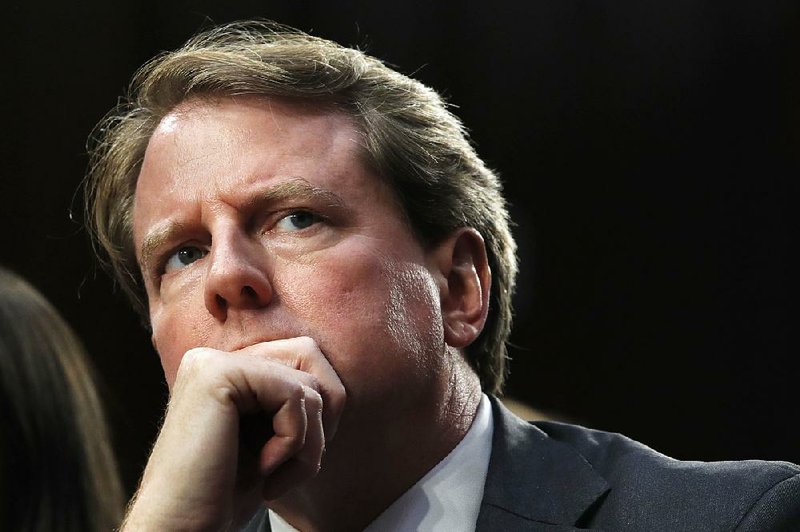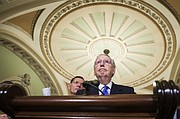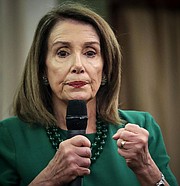WASHINGTON -- The White House stepped in Tuesday to stop Donald McGahn, the former White House counsel, from handing over documents subpoenaed by House investigators, hinting that President Donald Trump would assert executive privilege over them.
The current White House counsel, Pat Cipollone, instructed the House Judiciary Committee to redirect to the White House its requests for the records, which relate to key episodes of possible obstruction of justice identified by Robert Mueller, the special counsel.
"The White House provided these records to Mr. McGahn in connection with its cooperation with the special counsel's investigation and with clear understanding that the records remain subject to the control of the White House for all purposes," Cipollone wrote in a letter to the committee's chairman, Rep. Jerrold Nadler, D-N.Y. "The White House records remain legally protected from disclosure under longstanding constitutional principle, because they implicate significant executive branch confidentiality interests and executive privilege."
Though it raises the specter of executive privilege, a power meant to shield conversations between the president and his closest advisers, the president has not actually invoked that shield. Democrats argue that Trump long ago lost the authority to withhold the material in question since he allowed McGahn to provide it to his own private lawyer and discuss it at length with Mueller. Much of it is also referred to publicly in the special counsel's 448-page report.
In a letter to McGahn's lawyer Tuesday evening, Nadler rejected the argument that McGahn has no right to turn over documents to the committee. He said the "blanket suggestion of potential privilege is entirely insufficient."
Nadler also threatened to hold McGahn in contempt of Congress if he doesn't testify before the committee later this month.
McGahn, who is cited more than any other witness in the Mueller report, was obligated to turn the documents over to investigators Tuesday, the deadline for a House Judiciary Committee subpoena.
Trump has defied requests from House Democrats since the release of Mueller's report last month. Republicans have largely united behind the president, with Senate Majority Leader Mitch McConnell on Tuesday declaring "case closed" on Mueller's Russia probe and potential obstruction by Trump. McConnell said Democrats are "grieving" the result.
Mueller said he could not establish a criminal conspiracy between the Trump campaign and Russia, but did not reach a conclusion on whether Trump obstructed justice. Mueller didn't charge Trump but wrote that he couldn't exonerate him, either.
Democrats say the case is anything but closed and are conducting their own review of Mueller's investigation of Russian election interference.
The White House's stance increases pressure on McGahn to ultimately decide whether to defy Trump and cooperate with the committee or hold the administration's line. His lawyer, William Burck, told the committee in a letter Tuesday that in light of the White House position and McGahn's continuing "duties and obligations" to Trump, he would wait out potential discussions between the House and the White House.
"Where coequal branches of government are making contradictory demands on Mr. McGahn concerning the same set of documents, the appropriate response for Mr. McGahn is to maintain the status quo unless and until the committee and the executive branch can reach an accommodation," Burck wrote.
McGahn believes there is little he can do without either the permission of the president, whom he views as akin to a client he was working for, or a court order to cooperate, a person close to McGahn said.
Democrats are likely to object to the White House's intervention in light of its other ongoing efforts to thwart their abilities to investigate the president and his administration. They could still choose to initiate contempt-of-Congress proceedings against McGahn.
Nadler did not immediately comment on the letters. His Republican counterpart, Rep. Doug Collins of Georgia, said he was pleased with the arrangement.
Democrats on the Judiciary Committee were separately meeting with Justice Department officials Tuesday in a last-ditch effort to stave off another contempt proceeding, against Attorney General William Barr. Last week, Barr failed to comply with a subpoena to hand over a full version of Mueller's report and underlying evidence. The committee has scheduled a vote today to recommend a contempt citation to the full House.
McConnell, meanwhile, opened the Senate on Tuesday with a speech discussing how Mueller's "exhaustive" investigation is now complete.
"It's finally over," the Kentucky Republican said. He called Mueller's findings "bad news for the outrage industrial complex but good news for the rest of the country."
The speech drew swift rebuttals from Democrats. House Speaker Nancy Pelosi and Senate Democratic leader Charles Schumer issued a joint statement calling it "a stunning act of political cynicism and a brazen violation of the oath we all take."
After McConnell's speech, Massachusetts Sen. Elizabeth Warren, a Democratic presidential candidate, made her own trip to the Senate floor to say the House should begin impeachment proceedings -- a step that Pelosi has so far resisted. Yet Pelosi also said Trump seems to be "making the case" for his impeachment by brazenly obstructing investigations.
She said steps to block access to information requested by Congress amounted to obstruction of justice by the president. She compared his actions to those of President Richard Nixon, whose refusal to satisfy House subpoenas ultimately became fodder for their own impeachment article in the House Judiciary Committee before he resigned.
"Trump is goading us to impeach him," Pelosi said at a Cornell University event in New York City. "That's what he is doing, every single day he is just, like, taunting, taunting, taunting. Because he knows that it would be very divisive in the country. But he doesn't really care; he just wants to solidify his base."
Pelosi said she is pushing her caucus not to take up the debate, but to continue to try to line up the facts and build support among American voters.
The subpoena requested from McGahn all documents and communications on more than 30 subjects, including all the major episodes that Mueller examined to determine whether the president obstructed justice. Among them were: the firing of James Comey as FBI director, attempts to fire Mueller and the president's effort to have McGahn write a false document recanting what he told investigators.
The subpoena for McGahn also instructed him to appear May 21 to testify publicly before the Judiciary Committee. Regardless of the White House's stance, Democrats are unlikely to let him off the hook. They could force McGahn to take the witness stand anyway and publicly field questions that Trump has indicated he does not want answered.
Burck did not comment on the hearing in his letter Tuesday.
Information for this article was contributed by Nicholas Fandos, Maggie Haberman and Michael S. Schmidt of The New York Times; by Rachael Bade, Carol D. Leonnig and Josh Dawsey of The Washington Post; and by Mary Clare Jalonick, Lisa Mascaro and Eric Tucker of The Associated Press.
A Section on 05/08/2019


